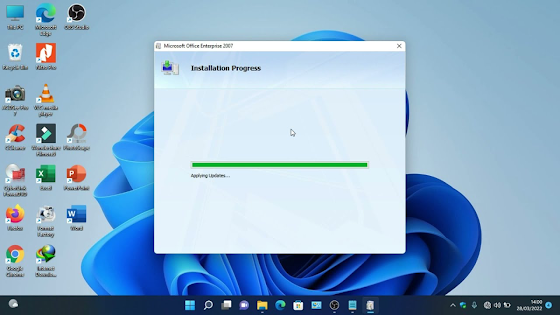Download Link!
Microsoft Office 2007: Evolution, Impact, and Beyond
In the world of office software, few products have left as significant a mark as Microsoft Office 2007. From its revolutionary user interface to its enduring influence on how we create and share documents, spreadsheets, and presentations, Office 2007 has shaped the way we work for over a decade. Let's delve into its history, impact, and why it still matters today.
History of Microsoft Office 2007
Key Features
One of the most notable features of Office 2007 was the introduction of the Ribbon interface, a departure from the traditional menu-based UI. This change aimed to make features more accessible and intuitive, though it initially faced resistance from longtime users.
Impact on Office Software Industry
User Interface Revolution
The Ribbon interface revolutionized how users interacted with Office applications, paving the way for a more visual and efficient workflow. While it took some getting used to, many users ultimately embraced the change for its convenience and improved functionality.
File Format Changes
Office 2007 also introduced the XML-based file formats (.docx, .xlsx, .pptx), which offered improved data recovery, smaller file sizes, and enhanced security compared to previous versions. However, this led to compatibility challenges for users of older Office suites.
Compatibility and Transition
Compatibility Challenges
The transition to Office 2007 wasn't without its hurdles, particularly for businesses reliant on legacy systems or custom macros. Compatibility issues with older file formats and third-party plugins necessitated careful planning and testing before upgrading.
Migration Tips
To ease the transition, Microsoft provided tools and resources to help users migrate smoothly to Office 2007. Additionally, training and support materials were made available to assist users in adapting to the new interface and features.
Legacy and Current Usage
Legacy Systems
Despite the release of newer Office versions, Office 2007 continues to be used by many organizations and individuals worldwide, particularly in environments where compatibility with older systems is crucial.
Current Adoption Trends
While adoption of newer Office suites like Office 365 has been on the rise, Office 2007 still maintains a significant user base, especially among small businesses and individuals who prefer its familiar interface and functionality.
Importance of Upgrading
Security Concerns
With the end of support for Office 2007, security vulnerabilities may pose a risk to users who continue to rely on the outdated software. Upgrading to a newer version or migrating to a cloud-based solution can help mitigate these risks.
Enhanced Functionality
Newer Office suites offer enhanced features, collaboration tools, and cloud integration that can improve productivity and streamline workflows. Upgrading ensures access to the latest innovations and support from Microsoft.
Alternatives and Competition
Competing Office Suites
While Microsoft Office remains the industry standard, there are several competing office suites available, such as Google Workspace and LibreOffice, which offer similar functionality and compatibility at varying price points.
Open Source Solutions
Open source office suites like LibreOffice provide a cost-effective alternative to Microsoft Office, with support for multiple platforms and file formats. These solutions are particularly attractive to budget-conscious users and organizations.
Tips for Optimizing Office 2007
Performance Tweaks
To maximize efficiency and performance, users can optimize Office 2007 by disabling unnecessary add-ins, optimizing system resources, and keeping software updated with the latest patches and service packs.
Customization Options
Office 2007 offers a range of customization options, including personalized toolbars, keyboard shortcuts, and templates. By tailoring the software to suit individual preferences and workflows, users can enhance productivity and user experience.
Future Outlook
End of Support
With Microsoft ending support for Office 2007, users are encouraged to upgrade to newer versions or explore alternative solutions to ensure continued security and compatibility with evolving technology standards.
Transition to Cloud-Based Solutions
The shift towards cloud-based office suites like Office 365 and Google Workspace offers users greater flexibility, scalability, and collaboration capabilities. Embracing cloud technology can future-proof businesses and streamline productivity in the digital age.
Conclusion
Microsoft Office 2007 revolutionized the office software industry with its innovative features and user-friendly interface. While it continues to be used by many, the importance of upgrading to newer versions or exploring alternative solutions cannot be overstated. As technology evolves, so too must our tools for productivity and collaboration.
FAQs:
Is Microsoft Office 2007 still supported?
No, Microsoft ended support for Office 2007 on October 10, 2017. Users are advised to upgrade to newer versions for continued security updates and support.
Can I upgrade directly to Office 365?
Yes, users can upgrade directly to Office 365 or other newer versions of Microsoft Office from Office 2007. However, it's recommended to check system requirements and compatibility before upgrading.
Are there free alternatives to Office 2007?
Yes, there are several free alternatives to Office 2007, including LibreOffice, Apache OpenOffice, and Google Docs. These open-source and cloud-based solutions offer similar functionality and compatibility with Office file formats.
How can I improve the performance of Office 2007?
To improve performance, users can disable unnecessary add-ins, optimize system resources, and ensure that the software is updated with the latest patches and service packs.
What are the risks of continuing to use Office 2007?
Continuing to use Office 2007 poses security risks due to the lack of updates and support from Microsoft. Users may also encounter compatibility issues with newer file formats and software integrations.






![Driver Easy Pro 2024 Pre-Activated Latest Version Free Download [100% Working]](https://blogger.googleusercontent.com/img/a/AVvXsEj8Gi7x0-ZB1WA-e_M5qLtK-i5kI2BlT6bv9fIS-3WQJP8EoFir84JiHGcqEfOkCxZ58unmo5Gg-imft220F3yCHdyTd8h-er1iknb53XTuQ_gAinWR2WJkyguPH0qnRPwZpjbZMunSfNLtqyL-xEjQrNOJyTiRBAHS0Kd6pJDvAlsnMIj_8kA4GqH85C3l=w72-h72-p-k-no-nu)
